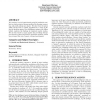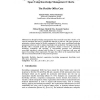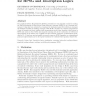799 search results - page 130 / 160 » Heterogeneous reasoning in learning to model |
SPATIALCOGNITION
2000
Springer
13 years 11 months ago
2000
Springer
We present an approach to spatial inference which is based on the procedural semantics of spatial relations. In contrast to qualitative reasoning, we do not use discrete symbolic m...
ATAL
2008
Springer
13 years 9 months ago
2008
Springer
We construct a novel agent-based model of prediction markets in which putative human qualities like learning, reasoning, and profit-seeking are absent. We show that the prices whi...
JUCS
2008
13 years 7 months ago
2008
: Even though knowledge management has been around for more than a decade, so far concrete instruments that can be systematically deployed are still rare. This paper presents an op...
IGPL
2007
13 years 7 months ago
2007
The graphical software Morph Moulder (MoMo) presented here was originally created for teaching the logical foundations of Head-Driven Phrase Structure Grammar (HPSG) in an e-Learn...
COLING
2002
13 years 7 months ago
2002
It is shown that basic language processes such as the production of free word associations and the generation of synonyms can be simulated using statistical models that analyze th...



